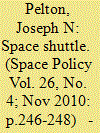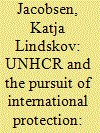| Srl | Item |
| 1 |
ID:
100223


|
|
|
|
|
| Publication |
2010.
|
| Summary/Abstract |
The Space Transportation System (STS), for better or worse, has dominated the US space program for some 30 years and is now an American icon. The Space Shuttle orbiters have flown over 120 missions and certainly accomplished some amazing feats, including the deployment of the International Space Station (ISS), the launch and double repair of the Hubble Telescope, a number of classified missions for the US defense establishment and the cementing of international cooperation in space. As the remaining Space Shuttle orbiters head toward various museums, it is timely to look at the STS program in terms of key US space policy decisions that have paralleled the Space Shuttle's often troubled history. This article seeks, from both a historical and a policy perspective, to assess what might have been. While noting the major accomplishments of the STS, it also identifies what can best be characterized as major lost opportunities and flawed policy decisions that have had multi-billion dollar consequences. In this regard, the US Congress, the White House, and NASA leadership have all played a role. If there have been failings, they have not been by NASA alone, but the entire US space policy leadership.
|
|
|
|
|
|
|
|
|
|
|
|
|
|
|
|
| 2 |
ID:
163053


|
|
|
|
|
| Summary/Abstract |
Better management and new technological solutions are increasingly portrayed as the way to improve refugee protection and enhance the accountability of humanitarian actors. Taking concepts of legibility, quantification and co-production as the point of departure, this article explores how techno-bureaucratic practices shape conceptions of international refugee protection. We do this by examining the evolving roles of results-based management (RBM), biometrics and cash-based interventions as ‘accountability technologies’ in the United Nations High Commissioner for Refugees’ international protection efforts. The article challenges the assumption that these technologies produce a seamless form of accountability that is equally attentive to donor requests and the protection needs of refugees. By focusing on how the constitution of these techniques as ‘accountability solutions’ shapes conceptions of the very meaning of protection (ie the problem to be addressed), we also show what dimensions of protection get omitted in this co-production of technical solutions and socio-political problems.
|
|
|
|
|
|
|
|
|
|
|
|
|
|
|
|